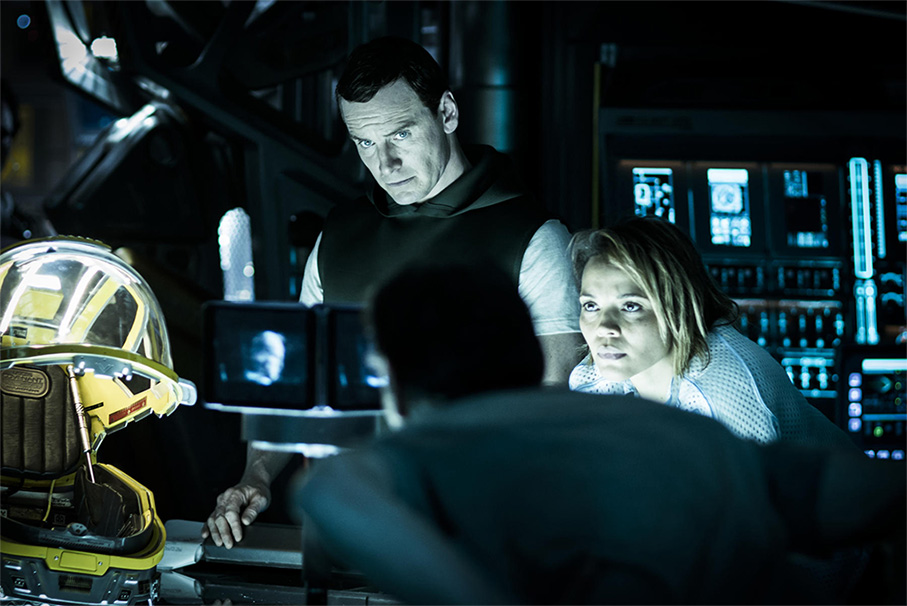| |
"Theology: an agreement which brings about a relationship of commitment between God and his people." |
| |
Dictionary definition of 'covenant'. |
Set well after the events of Prometheus, a spaceship bearing terraformers and embryonic soon-to-be colonists is headed for a suitable planet to transform into an alternative Earth. Something happens that disrupts the ship's progress (some high minded soul christened the handsome craft 'Covenant') and while repairing what look like solar sails, one of the space-walking crew receives a garbled transmission. OK. This is the first of many significant nods to the franchise, as we start with the decryption of a mysterious message from somewhere in space (where no one can hear you scream, or warn, or call for help, or simply say "Stay the hell away..." or even appreciate John Denver). Trust me, that wasn't a random country and western name check. After a disastrously fatal wake up from cryosleep for some of the crew, Billy Crudup's reluctantly promoted Capt. Oram takes command. In the first of the film's many WTF moments we find out he's a religious adherent. A born again... on a freaking space ship? Jesus. What happened to the future-NASA screening process? I know a lot of returning moon astronauts had religious conversions (true, really) but this aspect of the captain's character just serves to prime the audience that the alien and the Bible seem to be inextricably intertwined. Why? Literally, give me a break, preferably between both ideas. After some opposition from the Sigourney Weaver survive-a-like, Katherine Waterston, Crudup decides to investigate the signal based on the hazy and hardly conclusive fact that none of his mostly married crew wants to go back to sleep for over seven years to reach the planet they were aiming to colonise in the first place. He makes this decision despite the cinema audience all shouting at the screen "Idiot! Haven't you been watching the franchise?" Well, he takes a landing party down including the Michael Fassbender upgraded synthetic 'Walter' and let's just say that things don't go that well. Beware black goo spores in the air, frightened colleagues with guns and blood slicks to slip on. And... aliens. New ones! In fact, 'neomorphs'!

Director Ridley Scott seems overly enthusiastic to graft enormous ideas and timeless, philosophical themes on to the legacy of his own one great 'alien' movie despite the fact that his original was simply a brilliantly designed and executed 'boo' film with an extraordinarily potent, wonderfully realised and rarely seen monster. Reversing this idea, this is akin to Mickey Mouse starring as the lead character in The Seventh Seal. OK, that's harsh. Donald Duck maybe... The 'real' Donald... The reaction to Prometheus convinced Scott that what people want in an alien movie is (no prizes for the answer). Despite the film's financial success, it received a mixed amount of satisfied appreciation – it was a movie set in the alien universe without its eponymous star (with all due respect to Sigourney Weaver). The new, sharp-skulled xenomorph's grisly birth at the end of the earlier film was something of a sop to the fans and I felt that it was an unworthy gesture. Narratively, what was the point of it? It served no dramatic purpose as the movie was to all intents over. Prometheus was an interesting, if perhaps flawed experiment and I'm still on the fence – as proof, see my two reviews for the film, one reacting to a highly anticipated movie and the other, a more measured piece reviewing the 3D domestic Blu-ray. Prometheus was overladen with religious iconography and Scott has subsequently built from its narrative and glued on even more of the same – I swear I saw a baby xenomorph crucified on a table at the midway point of Covenant. Adding to the mix are many more ideas about creators, gods and monsters. Hey ho. The synthetic human David from Prometheus, now with added body, has judged his own creator's species unworthy of his continued respect and attention with the result that the synthetic 'created' has spurned its human 'creator'. David is not so much Michelangelo's perfect sculpture but more like Danté's three-faced Lucifer so let's not forget his forging a god-like ambition of his own; to destroy and to create. What he seems to want to create is fundamentally perverse.
The mysterious link between the acknowledgment of David's own inhuman superiority (where are Asimov's three laws of robotics when we need them?) and his wilfully causing a casual genocide of the prequel's giant engineers was never clear to me. The production photos have given these images away well before the release of the movie so I don't feel I'm spoiling anything. But does this mean that the entire population of the engineers lived in the equivalent of the Vatican City size-wise while the rest of the planet is just vegetation? I am so tired of asking questions about the alien universe. Just scare the shit out of me like the original did, OK? Alas. It's not 1979 anymore and neither am I 18 years old. David's goals in Covenant seem to exist based solely on a few lines from the original. The disembodied head of Ian Holm's android Ash delivers his sympathies to the remaining crew of the Nostromo with chilling lines regarding their stowaway: "Perfect organism. Its structural perfection is matched only by its hostility." Perfect organism? Why is perfection so entrenched with vicious and unfeeling destruction? Why, oh why, would a synthetic human being revere hostility? The only reason would be that David has gone insane... Can robotic software corrupt and mimic human mental disease? The one small hint is that the character gets a simple fact wrong (the identity of the author of a poem) and synthetics don't do 'wrong'. Or if they do, the repercussions can be HAL-like in their severity. 'Human error' is no longer a valid excuse. And David's connection to that extraordinary poem is based on its apparent celebration of majesty and not its true theme of impermanence. The film editor I first assisted in my career had Shelly's famous poem Ozymandias up on the door of his BBC cutting room in which I worked many decades ago so I'm quite familiar with it. Fans of Watchmen should also recognise its titular relevance. It ends with the mocking of a celebration of supremacy, a quote for those to witness what great power had wrought, '"Look on my works, ye mighty, and despair..."' But in conclusion, the desert has claimed 'my works' because time takes no prisoners. Take a good look at the famous Egyptian Sphinx and see how time has ravaged its face. What was David trying to have us believe with the reference to Wagner's Die Rheingold's 'Entry of the gods into Valhalla'? As we assume he was on Earth in the prologue, he could not have been referencing the 'alien' engineers then but did he mean to celebrate his own divinity when he summoned the music from the ship's computer banks? Is this reference all part of Scott's intellectual rebirth of Twentieth Century Fox's franchise? Can an alien movie be pretentious?

To restate; Alien was a landmark in cinema and cinematic science fiction. It did its job and it did its job superbly well. In the sequel, the 'boo!' of the original was replaced by the reverence of weaponry and a few fiercely opposing examples of mother love. A bloated Fox committee together with original producers Brandywine misconceived the third but to me, the picture is still interesting despite the prevalence of faith among the planet's inmates. Fincher is many things but never dull. French director Jean-Pierre Jeunet interpreted Joss Whedon's fourth Alien Resurrection screenplay rather differently than the Buffy scribe would have liked (check out the baby alien-human hybrid, oh dear). Note that religious ideas and iconography have made fleeting contact with the four alien movies though if you are ever faced with H.R. Giger's black insectoid demon with Jerry Goldsmith's cold-blooded score behind you, you may utter something religious. OK, I do have to acknowledge the director of The Navigator; A Medieval Odyssey and his first idea for Alien 3. Vincent Ward suggested that the alien was perceived as the devil on a wooden planet full of monks. Now, I would have paid to see that. Ridley Scott said once that a good movie should be a layered cake and I agree with him to a degree. It's all a matter of intent. In over-loading a horror film with ideas that have wandered in from a very different movie, ideas that its central purpose cannot really heft with any believability, and you're stuck with a film that promotes its intellectual credibility while trying to scare you. Do you want me to think metaphorically or sink into my chair, ears blocked because we all know it's the sound that is the real terrifying element? OK, let's be honest. I love both chocolate and steak but they do not go well together even though both are delicious... Context. It's all about context.
Alien Covenant is rollicking entertainment. Let's not deny that. But surely we all know going in that the following will be true; there will be blood, very few survivors, robot action and the expectation of the inevitable sequel. Computer generated imagery will serve up the alien effects despite how audiences feel about such ever-more sophisticated refinements. I often think that what the audience needs is a Men In Black memory-wipe so we can see these extraordinary creatures and have no clue how their apparent reality was achieved. Yes, Scott had a man in a suit performing the alien in production but Scott is in charge of (and at the mercy of) cutting edge tech and I have to say, the neomorphs' action is tremendously well done, exciting and scary (a bit) even though we modern audiences cannot unburden our heads with "Oh, it's CG..." It's an effects reversal. The alien is created on set but then replaced and gussied up by the power of the pixel. There is no other way for these creatures to perform inhuman feats but for all of Scott's insistence of getting what he can in front of a physical lens, post-production expertise steps in like Oliver Hardy, moving Stan Laurel out of the way. There is great entertainment to be had watching Alien Covenant. But it's not, given the almost forty year gap between the franchise's genesis and where we are now, a movie worthy of inclusion in the same league as Ridley Scott's original. But we all know that, don't we?
|